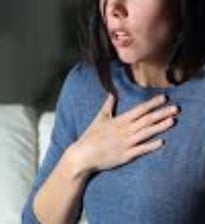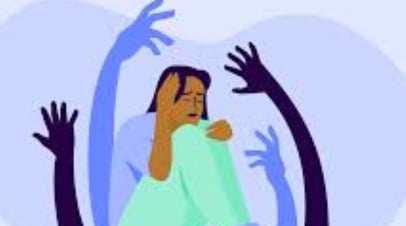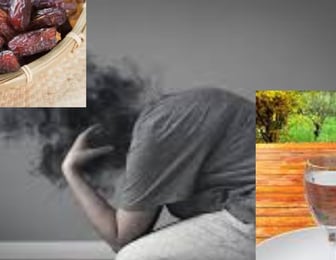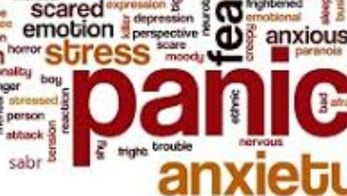
Panic vs Anxiety Attack vs Mental Breakdown : Fasting
Discover effective panic attack treatment strategies, including voluntary fasting, cognitive behavioral therapy, and relaxation techniques. Learn how to manage anxiety, reduce stress, and improve mental health through holistic approaches, mindfulness, and lifestyle changes.
PSYCHOLOGY
Dr Hassan AlWarraqi
1/28/20255 min read


Panic Attacks : Fasting
Panic Attacks: Understanding the Role of Fasting as a Treatment Approach
Introduction
A panic attack is a sudden episode of intense fear or anxiety that triggers severe physical and emotional reactions.
These attacks can occur without warning and can be extremely frightening, often making the person feel like they're losing control or facing imminent death.
While panic attacks are distressing, they are not physically dangerous.
Understanding Panic Attacks
Key Physical Symptoms
Rapid heartbeat or palpitations
Sweating and chills
Trembling or shaking
Shortness of breath or feeling of choking
Chest pain or discomfort
Nausea or stomach distress
Dizziness or lightheadedness
Numbness or tingling sensations
Psychological Symptoms
Fear of losing control
Fear of death
Feelings of unreality (derealization)
Detachment from oneself or surroundings (depersonalization)
Panic Disorder
When panic attacks become recurring and accompanied by persistent worry about future attacks, it may be diagnosed as panic disorder. This condition can lead to:
Avoidance of situations and places
Changes in daily behavior
Significant impact on quality of life
The Role of Voluntary Fasting in Managing Panic Attacks
Potential Benefits of Fasting
Stress Reduction and Emotional Regulation
Helps regulate stress hormones like cortisol
May contribute to a calmer mental state
Could reduce frequency and intensity of panic attacks
Brain Function Enhancement
Promotes production of Brain-Derived Neurotrophic Factor (BDNF)
Supports cognitive function
May help in managing anxiety symptoms
Mental Clarity and Focus
Can increase mental clarity
May help in managing thoughts during anxious moments
Potential to break catastrophic thinking patterns
Neurotransmitter Balance
May affect serotonin and dopamine balance
Could help in mood regulation
Potential reduction in anxiety levels
Mindfulness and Self-Control
Encourages mindfulness practices
Develops better emotional control
May help in managing panic triggers
Anti-inflammatory Effects
Reduces systemic inflammation
May alleviate some physiological factors contributing to anxiety
Important Considerations for Fasting
Medical Supervision
Consult healthcare providers before starting
Not suitable for everyone
Should be part of a comprehensive treatment plan
Integration with Traditional Treatments
Should complement, not replace, established treatments
Can be used alongside therapy and medication
Regular monitoring of effects
Individual Variation
Effects vary from person to person
Some may experience increased anxiety
Need for personalized approach
Treatment Approaches
Conventional Treatments
Medication
Antidepressants (SSRIs and SNRIs)
Anti-anxiety medications
Other medications as prescribed
Psychological Therapy
Cognitive Behavioral Therapy (CBT)
Exposure therapy
Relaxation techniques
Interpersonal therapy
Lifestyle Changes
Regular exercise
Reduced caffeine and alcohol intake
Improved sleep habits
Stress management techniques
Prevention and Management
Adherence to treatment plan
Learning breathing and relaxation techniques
Building social support network
Identifying and avoiding anxiety triggers
Conclusion
While fasting may offer potential benefits in managing panic attacks, it should be approached carefully and as part of a comprehensive treatment strategy.
The key is to work with healthcare professionals to develop an individualized approach that may include fasting alongside traditional treatments for optimal results.
Note: Always consult with healthcare providers before starting any new treatment approach, including fasting, especially if you have a history of panic attacks or other mental health conditions.
Frequently Asked Questions (FAQs) About Panic Attacks and Panic Disorder
1. What is a panic attack? How is it different from panic disorder?
A panic attack is a sudden episode of intense fear or discomfort, accompanied by physical and emotional symptoms such as rapid heartbeat, shortness of breath, dizziness, and fear of dying or losing control. It usually lasts a few minutes and peaks within about 10 minutes.
condition involving recurrent and unexpected panic attacks, along with persistent worry about future attacks and behavioral changes to avoid triggering situations. In short, a panic attack is an event, while panic disorder is a condition involving repeated episodes.
2. What are the physical and emotional symptoms of a panic attack?
Physical symptoms include:
Chest pain or discomfort.
Feeling of choking or a lump in the throat.
Dizziness, unsteadiness, or feeling faint.
Sweating or chills.
Nausea, stomach pain, or diarrhea.
Numbness or tingling.
Rapid heartbeat or palpitations.
Shortness of breath or a feeling of suffocation.
Trembling or shaking.
Emotional symptoms include:
Fear of dying.
Fear of losing control or going crazy.
Feelings of unreality or detachment from surroundings.
3. What are the possible causes of panic attacks?
The exact cause of panic attacks is not fully understood
, but several factors may contribute, including:
Genetic predisposition.
Severe stress.
Heightened sensitivity to stress.
Changes in brain function.
Childhood trauma.
Other mental health disorders.
Thyroid issues.
4. How is panic disorder diagnosed?
Diagnosis is based on:
Recurrent panic attacks.
Persistent worry about future attacks.
Behavioral changes to avoid triggering situations.
Ruling out other physical causes.
5. Are panic attacks dangerous? Can they occur during sleep?
Panic attacks are not physically dangerous, but they can lead to complications if left untreated. They can also occur during sleep, known as "nocturnal panic attacks."
6. Can voluntary fasting play a role in treating panic attacks?
Voluntary fasting may have complementary benefits in managing panic attacks, such as reducing stress and improving brain function. However, it should be part of a comprehensive treatment plan and conducted under medical supervision.
The Role of Voluntary Fasting in Treating Panic Attacks
Voluntary fasting may help by:
Reducing stress and regulating emotions.
Improving brain function.
Enhancing mental clarity and focus.
Balancing neurotransmitters.
Reducing inflammation.
Promoting mindfulness and self-discipline.
However, fasting should be done under medical supervision and should not replace primary treatments.
Difference Between Panic Attacks and Anxiety Attacks
Cause: Panic attacks occur suddenly without an obvious trigger, while anxiety attacks are usually linked to a stressful situation.
Intensity: Panic attacks are more severe and peak quickly.
Duration: Panic attacks last a few minutes, while anxiety attacks may last longer.
Keywords
Voluntary fasting, panic attack treatment, anxiety management, stress reduction, mental health, cognitive behavioral therapy (CBT), relaxation techniques, mindfulness, meditation, breathing exercises, lifestyle changes, dietary interventions, holistic approaches, psychological well-being, serotonin levels, cortisol reduction, self-discipline, emotional regulation, alternative therapies, mental clarity, physical health, spiritual practices, intermittent fasting, benefits of fasting, anxiety symptoms, panic disorder, coping strategies, psychological resilience, stress hormones, brain function, emotional balance, therapeutic fasting.

















